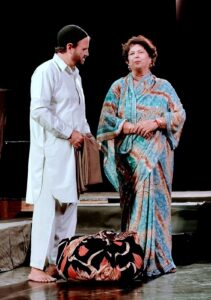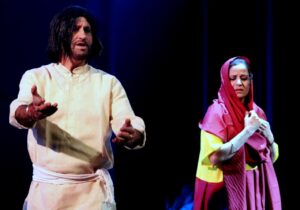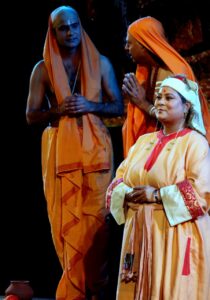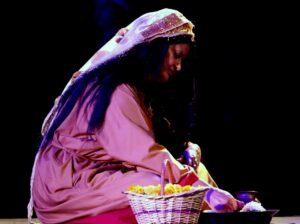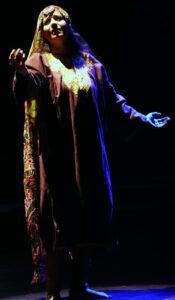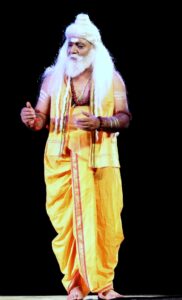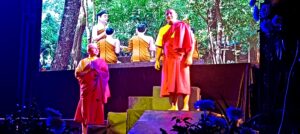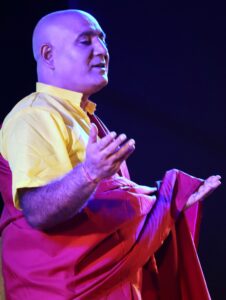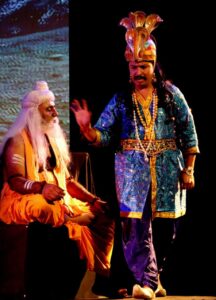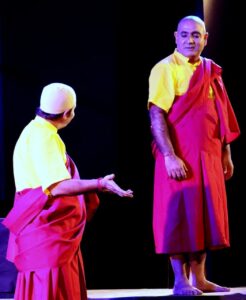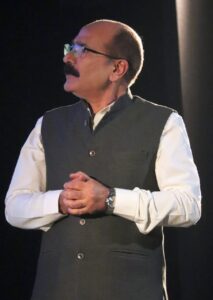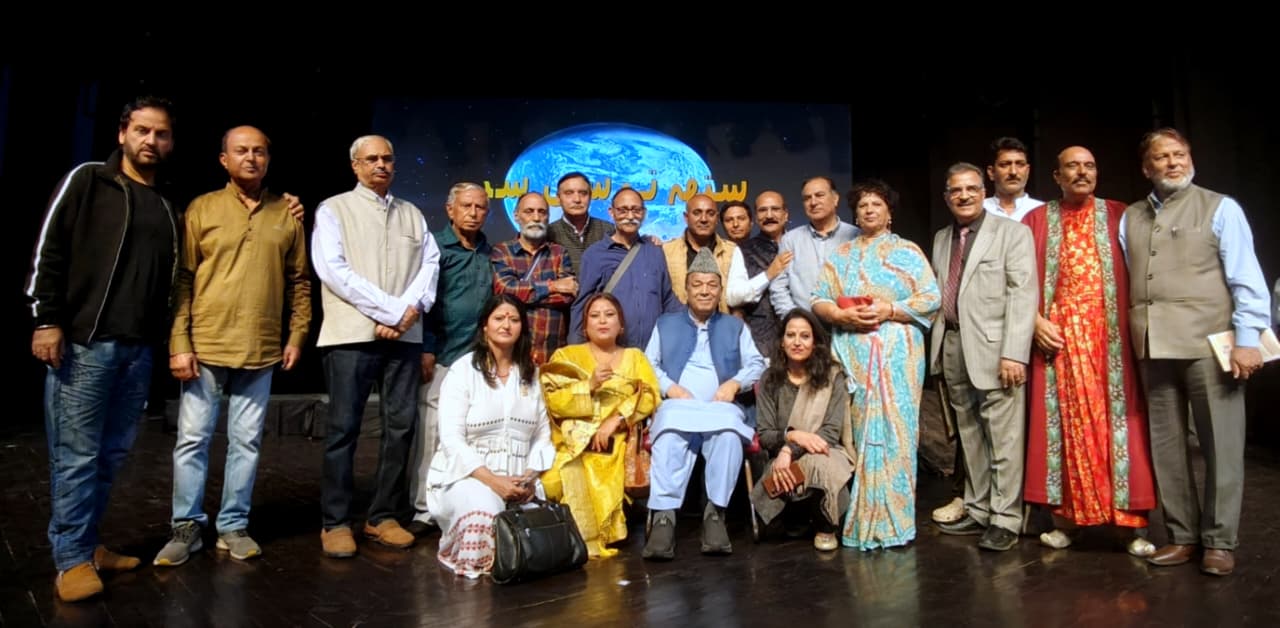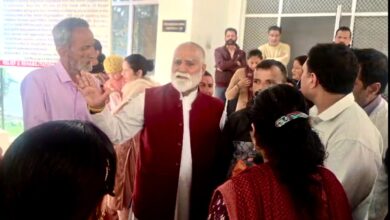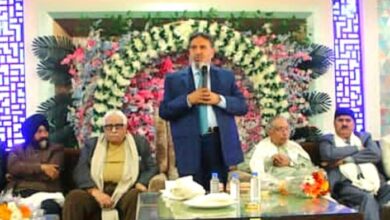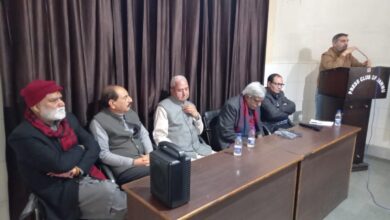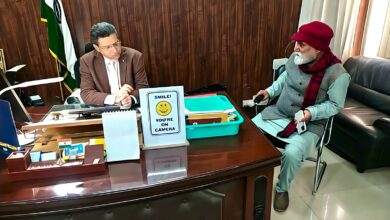Yemberzal Foundation’s “Sath Te Satisar” Mesmerizes Abhinav Theatre, Lauded for Cultural Depth
Kashmiri Cine-Theatrical Production Celebrates Valley's Glorious History, Spirituality, and Resilience initiates 2nd phase of JKAACL’s Saptahik Rangdhara (Saturday Series) Festival
Highlights
- Yemberzal Foundation successfully staged the 87-minute Kashmiri cine-theatrical production “Sath Te Satisar” at Abhinav Theatre, Jammu, as part of the J&K Academy of Art, Culture & Languages’ Saptahik Rangdhara Festival.
- The production, conceptualized by Prof. Farooq Fayaz and directed by Bihari Kak, was lauded by Chief Guest and Speaker Legislative Assembly Abdul Rahim Rather for highlighting Kashmir’s rich spiritual, social, and cultural traditions.
- “Sath Te Satisar” skillfully wove together Kashmir’s geological, historical, and spiritual journey, portraying figures like Rishi Kashap, Lal Ded, and Habba Khatoon, leaving the audience with an enduring impression of hope and pride.
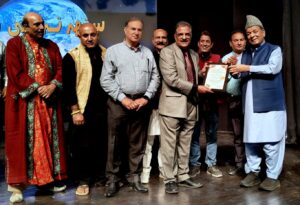
Jammu, November 08, 2025: The much-awaited Kashmiri cine-theatrical presentation “Sath Te Satisar” by the Yemberzal Foundation (Regd.) captivated a large audience today at Abhinav Theatre, Jammu. Staged as a prominent feature of the ongoing Saptahik Rangdhara (Saturday Series) Festival, organized by the Jammu & Kashmir Academy of Art, Culture & Languages (JKAACL), the 87-minute production was lauded for its artistic depth and profound cultural resonance.
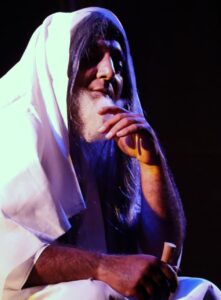
Shri Abdul Rahim Rather, Speaker of the Jammu and Kashmir Assembly, graced the occasion as the Chief Guest, extending his appreciation for the Foundation’s artistic endeavor. Shri Moti Koul was present as the Guest of Honour. In his address, Abdul Rahim Rather lauded the commendable efforts of the JKAACL and the Yemberzal Foundation for presenting such a meaningful and culturally rooted production. He specifically appreciated the entire team for vividly highlighting the glorious spiritual, social, and cultural traditions of Kashmir through a creative and thought-provoking medium. The Chief Guest later felicitated the Yemberzal Foundation team with a memento, joined by Dr. Javaid Rahi, Divisional Head, JKAACL Jammu, and Anil Tickoo, Assistant Cultural Officer, JKAACL.
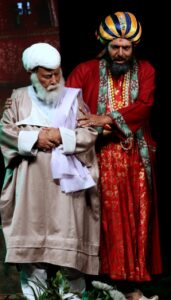
Earlier, in his welcome address, Director Bihari Kak elaborated on the concept and creative vision behind “Sath Te Satisar.” He described it as a symbolic journey tracing the mythological formation of the Kashmir Valley to its evolving social and cultural identity, calling the production an ode to the resilience, harmony, and undying hope of the Kashmiri People. The intricate concept, writing, and research for this ambitious production were meticulously undertaken by Prof. Farooq Fayaz, with additional dramatic sequences crafted by Dr. Gauri Shankar Raina, Kamal Razdan, and Ashok Gowhar. Bihari Kak directed the presentation, with Kamal Razdan serving as co-director.
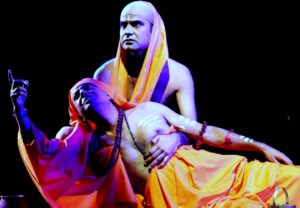
“Sath Te Satisar” draws profound inspiration from the legendary tale of Satisar—the mythical water body that once covered the present-day Kashmir Valley. The production skillfully wove together the geological, historical, and spiritual journey of the land, revisiting eras of glory, spirituality, and turbulence. It profoundly highlighted the teachings of luminaries such as Rishi Kashap, Adi Shankaracharya, Sufi Saints, and others who fundamentally shaped the ethos of the Valley, while also reflecting on significant periods of intellectual and cultural renaissance, including the reign of Zain-ul-Abidin (Budshah). True to its title, “Sath”—meaning Hope—the production powerfully symbolized the unbroken spirit of coexistence, faith, and cultural unity of the People of Kashmir. The opera’s rich musical tapestry, featuring powerful solo and choral renditions composed by Rajesh Khar, significantly enhanced the emotional depth of the performance, striking a deep chord with the audience.
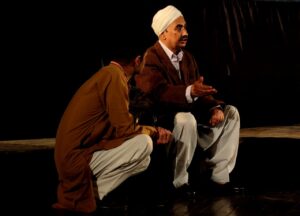
The production design, technical concept, and visual creation were masterfully executed by Ravi Kachroo and Ravi Pandita. Lyrics were penned by Prof. Farooq Fayaz, Prof. Veena Pandita Koul, and the Late Shyam Lal Pardesi. The narration, which seamlessly guided the audience through the epic tale, was delivered by P. K. Raina and Rajesh Kaw. Set, Make-up & costumes were designed by Anil Warikoo & had meticulously fabricated the headgears. He was assisted by Kapil Warikoo while Shammi Dhamir provided crucial assistance in Makeup. Lighting, a vital element in creating the ambiance, was designed by Ravi Kachroo and Pankaj, while the captivating choreography was done by Pummy Zutshi. Stage Management was efficiently overseen by Sahiba Bhat, Rakesh Mirza, J. K. Raina, and Naresh Koul.
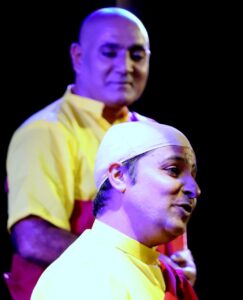
The distinguished ensemble cast, featuring prominent artists such as Kamal Razdan (Jalodbhava & Badshah), King C Bharati (who impressively portrayed three distinct roles: Rishi Kashyap, Vasumitra, and Shamas Faqueer), Ajay Waguzari (as Ashwa Gosh & Nel Naag), Pummy Zutshi (Lal Ded and Arni Mal), Ashok Zalpuri (Raja Baldev and Mehjhor), Suman Pandita (Heemal, Bodh Bikhshu & Habba Khatoon), Rahul Pandita (Nagrai, Shankaracharya’s Disciple and student), Vinay Pandita (Lover of Bodh Bikhshu and Irfan), Ashok Kaloo (Shankarachrya), Rani Bhan (Brahman Bhai), Ashok Zafrani (Shreya Bhat), and notably, Bharti Zaroo (Migrant Lady), breathed life into a spectrum of historical and mythical characters, including Rishi Kashap, Mouj Kasheer, Lal Ded, Shamas Faqeer, Habba Khatoon, and Mehjoor. The show was expertly anchored (Sutradaar) by Manoj Jad.
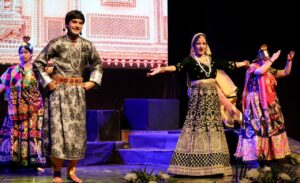
Beautifully performed dance sequences by Manvi Pandita, Sukriti Raina, Charvi Raina, Khushboo Koul, Gauri Raina, Vanshika Pandita, and Ruchika Koul added visual splendour to the production. Renowned Kashmiri singers Shaziya Bashir, Suresh Chawhan, Tsweng Dorjee, and Shivani Jyotshi rendered soulful songs, recorded at Kongposh Studios, with video editing by Anmol Creations. “Sath Te Satisar” successfully mesmerized the audience, leaving an enduring impression of pride and nostalgia for the land of sages and springs.
Dr. Javaid Rahi concluded the event by presenting the vote of thanks to the dignitaries, artists, and the appreciative audience While Ramesh Marhatta conducted the proceedings.
